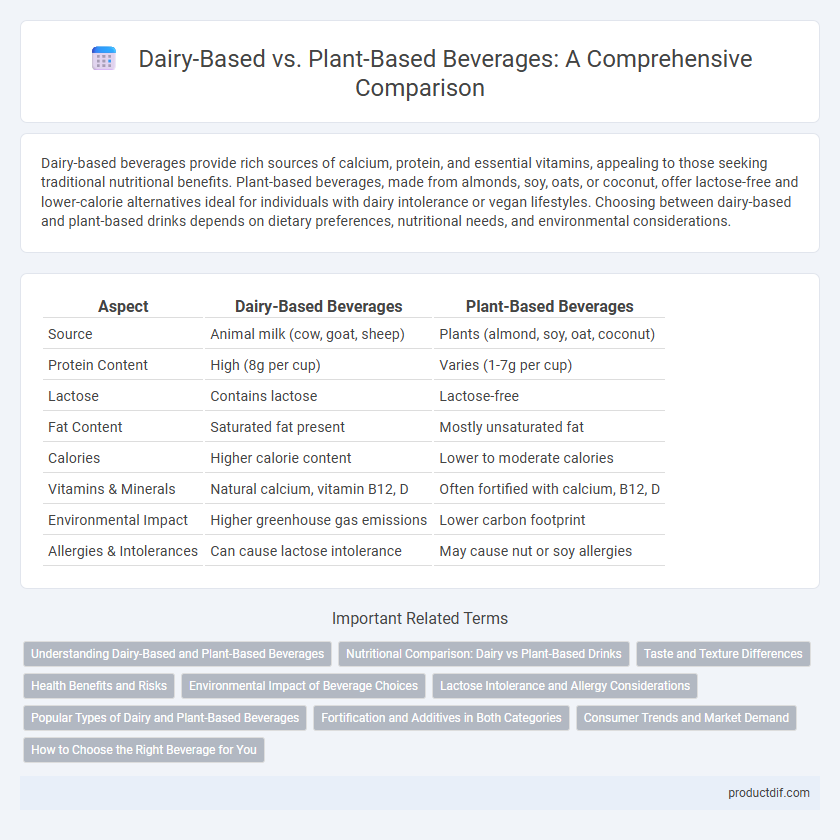Dairy-based beverages provide rich sources of calcium, protein, and essential vitamins, appealing to those seeking traditional nutritional benefits. Plant-based beverages, made from almonds, soy, oats, or coconut, offer lactose-free and lower-calorie alternatives ideal for individuals with dairy intolerance or vegan lifestyles. Choosing between dairy-based and plant-based drinks depends on dietary preferences, nutritional needs, and environmental considerations.
Table of Comparison
| Aspect | Dairy-Based Beverages | Plant-Based Beverages |
|---|---|---|
| Source | Animal milk (cow, goat, sheep) | Plants (almond, soy, oat, coconut) |
| Protein Content | High (8g per cup) | Varies (1-7g per cup) |
| Lactose | Contains lactose | Lactose-free |
| Fat Content | Saturated fat present | Mostly unsaturated fat |
| Calories | Higher calorie content | Lower to moderate calories |
| Vitamins & Minerals | Natural calcium, vitamin B12, D | Often fortified with calcium, B12, D |
| Environmental Impact | Higher greenhouse gas emissions | Lower carbon footprint |
| Allergies & Intolerances | Can cause lactose intolerance | May cause nut or soy allergies |
Understanding Dairy-Based and Plant-Based Beverages
Dairy-based beverages contain nutrients like calcium, protein, and vitamin D found naturally in cow's milk, offering benefits for bone health and muscle repair. Plant-based beverages, derived from sources such as almond, soy, oat, and coconut, provide alternatives for lactose intolerance and vegan diets while varying in protein content and micronutrients. Consumers should evaluate factors including nutritional profiles, sustainability, allergen potential, and personal dietary needs when choosing between dairy-based and plant-based beverage options.
Nutritional Comparison: Dairy vs Plant-Based Drinks
Dairy-based drinks provide high levels of calcium, vitamin D, and complete proteins essential for bone health and muscle maintenance. Plant-based beverages, such as almond, soy, and oat milk, offer varying nutritional profiles rich in fiber, antioxidants, and healthy fats but may lack adequate protein and calcium unless fortified. Consumers seeking nutritional equivalence should prioritize fortified plant-based options with added vitamins and minerals to match the benefits found in dairy products.
Taste and Texture Differences
Dairy-based beverages typically offer a creamy, rich texture with a naturally sweet and smooth taste due to lactose and fats, enhancing flavor complexity. Plant-based alternatives, such as almond, oat, or soy milk, often present varied textures ranging from thin and watery to creamy, with taste profiles influenced by base ingredients, sometimes carrying nutty, earthy, or grainy notes. Consumer preference frequently hinges on the perceived authenticity and mouthfeel, where dairy excels in creaminess while plant-based versions may appeal through unique flavors and lighter textures.
Health Benefits and Risks
Dairy-based beverages provide essential nutrients like calcium, vitamin D, and protein that support bone health but may pose risks for lactose-intolerant individuals and those with high cholesterol. Plant-based alternatives such as almond, soy, and oat milk offer lower saturated fat and are often fortified with vitamins and minerals, benefiting heart health and digestion while avoiding dairy allergens. Choosing between dairy and plant-based drinks depends on individual nutritional needs, allergy considerations, and health goals related to heart disease, lactose intolerance, and nutrient intake.
Environmental Impact of Beverage Choices
Dairy-based beverages contribute significantly to greenhouse gas emissions, consuming more water and land compared to plant-based alternatives like almond, soy, and oat milk. Plant-based beverages typically have a lower carbon footprint and use less natural resources, promoting sustainable agricultural practices. Choosing plant-based drinks supports environmental conservation by reducing deforestation and methane emissions associated with traditional dairy farming.
Lactose Intolerance and Allergy Considerations
Dairy-based beverages contain lactose, which can cause digestive discomfort for individuals with lactose intolerance, affecting millions globally. Plant-based alternatives such as almond, soy, and oat milk offer lactose-free options, making them suitable for those sensitive to dairy and allergic reactions to cow's milk proteins. Choosing between dairy-based and plant-based drinks depends heavily on personal dietary restrictions and allergy considerations, ensuring safe and comfortable consumption.
Popular Types of Dairy and Plant-Based Beverages
Popular dairy-based beverages include milk, yogurt drinks, and kefir, each rich in calcium and protein essential for bone health. Plant-based alternatives like almond milk, oat milk, and soy milk offer lactose-free options with varying nutrient profiles, often fortified with vitamins D and B12 to match dairy's nutritional benefits. Consumer preferences increasingly favor plant-based beverages due to allergy concerns, environmental impact, and dietary choices such as veganism.
Fortification and Additives in Both Categories
Dairy-based beverages commonly contain natural calcium and vitamin D, while many plant-based alternatives are fortified with these nutrients to match dairy's nutritional profile. Additives such as stabilizers, emulsifiers, and sweeteners vary widely between dairy and plant-based drinks, affecting texture and taste. Consumers seeking functional benefits often choose fortified plant-based options enriched with vitamins B12 and riboflavin, usually absent in non-fortified plant beverages.
Consumer Trends and Market Demand
Consumer trends indicate a rising preference for plant-based beverages driven by health consciousness, environmental concerns, and lactose intolerance. Dairy-based products maintain strong demand due to their nutritional benefits and established market presence but face challenges from shifting consumer perceptions. Market data reveals growth in plant-based beverages outpaces dairy alternatives, signaling significant demand shifts in the global beverage industry.
How to Choose the Right Beverage for You
Selecting the ideal beverage depends on individual dietary needs, taste preference, and nutritional goals. Dairy-based drinks provide high-quality protein, calcium, and vitamins D and B12, essential for bone health and muscle function. Plant-based alternatives, such as almond, soy, or oat milk, offer lower calories and cholesterol-free options, often enriched with vitamins and minerals suitable for lactose intolerance or vegan diets.
Dairy-Based vs Plant-Based Infographic

 productdif.com
productdif.com